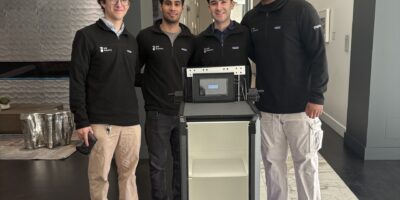Have you experienced disappointment upon arrival at E7 in September when you found that it was shut down for Hack the North? Or, have you even tried to sneak into Hack the North to secure some of the coveted company swag or snacks and been denied entry at the LinkedIn Bridge? As a result of these experiences, inevitably, you might have been semi-impressed and curious about the planning involved in such an event. Perhaps your next question would then be “What kind of planning goes into Hack the North?” To ease this burning question, the Iron Warrior attended Hack the North 2024 and even had the opportunity to interview the co-directors and various participants.
Joseph Wang, 3B computer science student and co-director of the event for the last 2 years, highlighted that the concentration of this year’s event began first with a mention of last year, Hack the North 2023. Hack the North 2023 was the 10th anniversary of the first iteration of the event, which meant that additional effort was invested to ensure it was a true celebration. With that level of extravagance and external-facing activities involved, it was “hard to follow”. Jasmine Jiang, 4A GBDA student and co-director, explained that the concentration of this year’s event was not on trying to top last year. Instead, the goal was to “ensure that we’re doing things so that Hack the North can stand strong for years to come.” She highlighted that the event “went back to its roots,” with a concentration on strengthening internal processes and a thorough evaluation of what has been successful. In addition to establishing robust internal processes for future Hack the North events, Jiang and Wang explained that community was a tenet of this year’s event. This was demonstrated through the outdoor hacking spaces and social events run throughout the weekend, to help hackers meet each other.
To get an idea of the scale of the event, this year there were approximately 950 hackers, 43 sponsors, and 9 partners in total. About one-half of all hackers are students at the University of Waterloo, with the remaining half comprising of a mix of high school and international students. Specifically, there were international students representing 10 countries. Erik Lundberg, a Masters student in computer science from Lund University located in Sweden, was one of the few international students chosen to participate in Hack the North. Lundberg was impressed at the scale and level of organization evident at the workshops and activities and shared that there is “no equivalent event in Sweden.”
In addition to hackers and organizers, plenty of experienced mentors were available to assist hackers as they worked on their projects. Steven Cao, a mentor and fifth-year Waterloo computer science student thought that “[Hack the North] is about pitching in where you can, it’s important to recognize that no idea is a bad idea.”
When asked about the future of Hack the North, Jiang thinks that events in the coming years will “depend largely on the organizing team and their goals. I’m sure the organizing team for Hack the North 2025 will continue to look for new experiences, opportunities, and activities for hackers and everyone involved in the event.” The work for next year’s event is already underway, as an event of this scale requires many months of work and dedication.





Leave a Reply